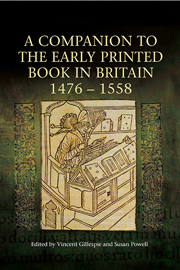Book contents
- Frontmatter
- Contents
- List of Illustrations
- List of Contributors
- Preface
- Acknowledgements
- Abbreviations
- Chronology of the Period
- Introduction
- I THE PRINTED BOOK TRADE
- II THE PRINTED BOOK AS ARTEFACT
- III PATRONS, PURCHASERS AND PRODUCTS
- IV THE CULTURAL CAPITAL OF PRINT
- 12 Humanism and Printing
- 13 Women Translators and the Early Printed Book
- 14 The Printed Book Trade in Response to Luther: English Books Printed Abroad
- 15 Thomas More, Print and the Idea of Censorship
- 16 Catholicism, the Printed Book and the Marian Restoration
- Index of Manuscripts
- Index of Printed Books
- General Index
15 - Thomas More, Print and the Idea of Censorship
from IV - THE CULTURAL CAPITAL OF PRINT
Published online by Cambridge University Press: 05 April 2014
- Frontmatter
- Contents
- List of Illustrations
- List of Contributors
- Preface
- Acknowledgements
- Abbreviations
- Chronology of the Period
- Introduction
- I THE PRINTED BOOK TRADE
- II THE PRINTED BOOK AS ARTEFACT
- III PATRONS, PURCHASERS AND PRODUCTS
- IV THE CULTURAL CAPITAL OF PRINT
- 12 Humanism and Printing
- 13 Women Translators and the Early Printed Book
- 14 The Printed Book Trade in Response to Luther: English Books Printed Abroad
- 15 Thomas More, Print and the Idea of Censorship
- 16 Catholicism, the Printed Book and the Marian Restoration
- Index of Manuscripts
- Index of Printed Books
- General Index
Summary
In 1536 Sir Thomas Elyot wrote to Thomas Cromwell in response to a recent proclamation, ‘Ordering the Surrender of Bishop Fisher's Sermon, Books’. Elyot was concerned because he did have books that fell within the scope of the proclamation, partly as a result, he told Cromwell, of his desire to read ‘many books, specially concerning humanitie and morall Philosophy’. Elyot went on to inform Cromwell that,
As touching suche books as be now prohibited contayning the busshop of Romes authorite, some in deede I have: joined with diverse other warkes in one grete volume or twoo at the moste, which I never found laysor to reade. Notwithstanding if it be the kinges pleasure and yours that I shall bringe or sende theim I will do it right gladly.
Elyot was worried that because he had been ill he had not had time to search all his properties for prohibited works and that he could therefore be accused of failing to carry out the duties imposed on him by the proclamation. It was perhaps this that led Elyot in his letter to ask Cromwell for more time to comply with the requirements of the proclamation.
… for as moche as my books be in sondry houses of myn owne and farre sonder, I hartily pray you that I may have convenient respeyte to repayre thither after my present recovery, and as I wold that god sholde helpe me I will make diligent serche, and such as I shall finde, savering any thinge agaynst the kinges pleasure, I will putt theim in redyness either to be browght to you, or to be cutt oute of the volume wherein they be joyned with other, as you shall advyse me …
- Type
- Chapter
- Information
- A Companion to the Early Printed Book in Britain, 1476-1558 , pp. 290 - 306Publisher: Boydell & BrewerPrint publication year: 2014



